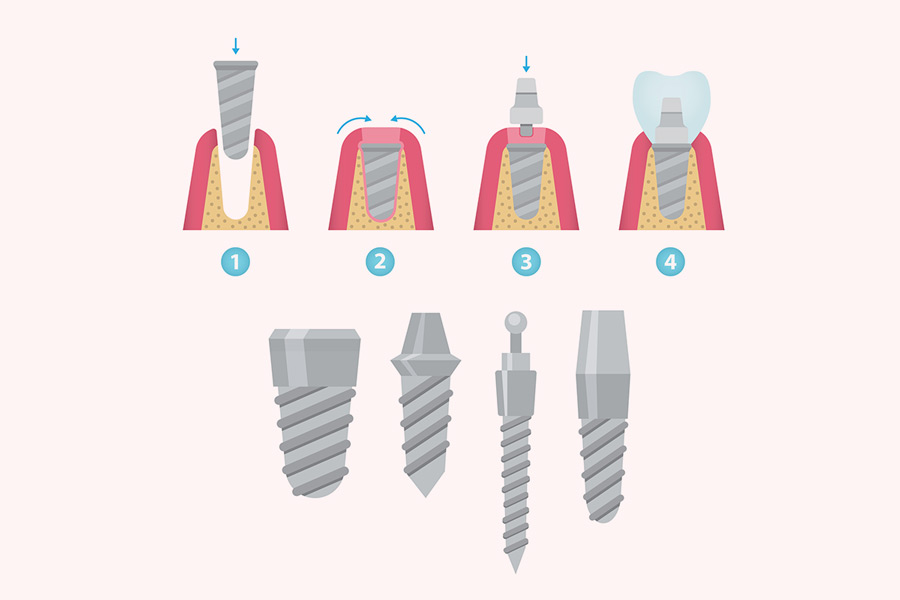- Home
- Types of Dental Implants: Which One Is Right for You?
Types of Dental Implants: Which One Is Right for You?
10 Apr 2025

If you’re considering dental implants to replace missing teeth, you’ve probably realized that there’s more than one type to choose from. From the classic titanium root-form implant to advanced solutions like zygomatic implants and mini implants, the variety can be overwhelming.
But don’t worry—choosing the right type of implant isn’t something you have to do alone. In this article, we’ll walk you through the different types of dental implants, explain their uses, and help you understand which option may be best for your unique needs.
What Are Dental Implants? (Quick Recap)
Dental implants are artificial tooth roots made of biocompatible materials (typically titanium or zirconia). They are surgically inserted into the jawbone to support a crown, bridge, or denture.
Core Benefits Include:
- Natural look and feel
- Long-lasting durability
- Preservation of jawbone and facial structure
- Restored chewing and speaking function
Main Types of Dental Implants
1. Endosteal Implants (Most Common)
What They Are:
These are the most widely used type of implant. They are placed directly into
the jawbone and serve as the foundation for one or more artificial teeth.
Best For:
- Patients with good bone density and healthy gums
- Replacing single or multiple teeth
Shapes and Variations:
- Screw-shaped (most common)
- Cylindrical or bladed
Pros:
- High success rate
- Long-lasting
- Compatible with a variety of prosthetic solutions
2. Subperiosteal Implants
What They Are:
Placed on top of the jawbone but under the gum tissue, these implants are used
when there’s not enough bone height for endosteal implants.
Best For: - Patients with shallow jawbone who can’t or don’t want to undergo bone grafting
Pros:
- Less invasive for certain patients
- Useful in cases of bone loss
Cons:
- Less stable than endosteal implants
- Less commonly used today due to advancements in grafting
3. Zygomatic Implants
What They Are:
Designed for patients with severe bone loss in the upper jaw, zygomatic implants
anchor into the cheekbone (zygoma) rather than the maxilla (upper jawbone).
Best For:
- Patients with significant bone loss in the upper arch
- Those not eligible for traditional implants or sinus lifts
Pros:
- Avoids the need for bone grafting
- Immediate functionality possible
Cons:
- Requires highly skilled surgeon
- More complex procedure
4. Mini Dental Implants (MDIs)
What They Are:
Smaller in diameter than traditional implants, these are typically used for
smaller teeth or to stabilize lower dentures.
Best For:
- Patients who lack sufficient bone for standard implants
- Those seeking a less invasive option
Pros:
- Shorter healing time
- Often placed without extensive surgery
- Lower cost
Cons:
- Not suitable for all cases
- May not last as long as standard implants
5. All-on-4 Implants
What They Are:
A full-arch restoration solution that uses four strategically placed implants to
support an entire row of teeth.
Best For:
- Patients who need full upper or lower arch replacement
- Those who want to avoid bone grafting
Pros:
- Fewer implants needed
- Fixed, natural-looking solution
- Immediate loading (same-day teeth)
Cons:
- Not removable by patient (permanent)
- May not be ideal for very young patients or minimal tooth loss
Materials: Titanium vs. Zirconia Implants
Titanium Implants
- Most commonly used
- Proven biocompatibility
- Long track record of success
Zirconia Implants
- Metal-free and white in color
- Great for patients with metal allergies or thin gums
- May be more prone to fracture
How to Choose the Right Implant Type
Choosing the right dental implant involves a detailed assessment by your dentist or oral surgeon. Factors they will consider include:
- Bone Volume and Quality
- If you have strong jawbone density, endosteal implants are ideal.
- If you lack bone, mini implants or zygomatic implants may be recommended.
- Number of Teeth Missing
- Single missing tooth: Standard endosteal implant + crown
- Multiple missing teeth: Implant-supported bridge or All-on-4
- Overall Health and Lifestyle
- Smokers, diabetics, or those with autoimmune disorders may require special treatment planning
- Budget
- While implants are an investment, some types (like mini implants) may be more budget-friendly in the short term
- Cosmetic Preferences
- Zirconia implants offer a metal-free, white-colored alternative for patients concerned about aesthetics
Combining Implant Types for Customized Solutions
Many modern treatment plans combine different types of implants to meet complex
needs. For example:
- Mini implants to stabilize a lower denture
- Zygomatic implants on the upper arch, combined with standard implants in the
lower
- All-on-4 for one arch and single implants for strategic teeth in the opposite
arch
Your treatment plan will be tailored to your unique anatomy, goals, and budget.
Final Thoughts: Trust the Process and Your Provider
Dental implants come in many shapes, sizes, and materials—but one thing remains constant: they are one of the most reliable, life-changing advancements in modern dentistry. Choosing the right implant solution is a collaboration between you and your dental team.
At Zahn Implant Club, we specialize in a wide range of implant options and create customized plans based on your needs. Whether you need a single tooth replaced or a full-mouth restoration, we’re here to help you make an informed and confident decision.
Schedule Your Consultation Today!
Call us at 916-258-7434 or visit Schedule a Free Consultation to book an appointment and take the first step toward a healthier, more confident smile!
-
4913 Golden Foothill Pkwy
El Dorado Hills, CA 95762 - 916-258-7434
- [email protected]
